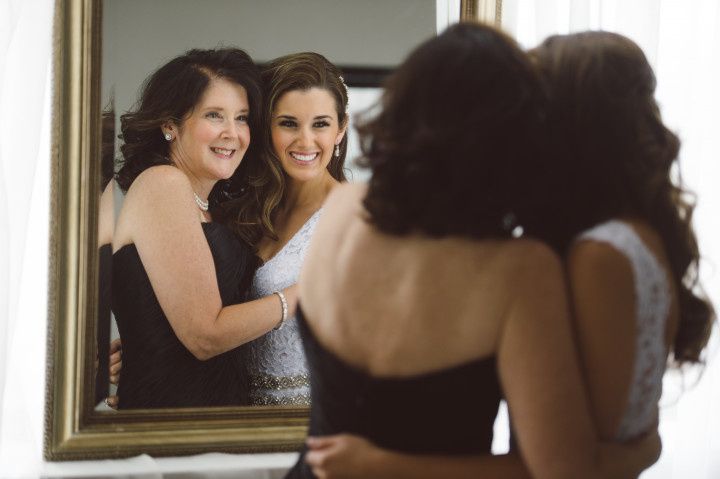How to Deal with an Overbearing Mother-in-Law
Here are some general guidelines to keep in mind to help with an overbearing mother-in-law.


Photo: Bit of Ivory Photography
We know, you’re trying to be totally zen about this whole wedding planning thing. But we know that even the chillest of brides can be sent over the edge if someone asks them one more time when they are planning on having kids—even as a joke. At least when it’s your acquaintance from high school, you can blow her off. When it’s your mother-in-law getting under your skin—well, that’s a little bit more of a delicate situation. After all, she’s going to officially be your family pretty soon. You definitely don’t want to burn any bridges just because she’s overbearing during your stressful wedding planning period.
So how do you deal?
Assume good intentions.
Your mother-in-law is most likely not trying to make your life a living hell. When you want to scream because she’s giving you more advice on the seating chart, remind yourself that she means well. She’s not trying to ruin your big day. More than likely, she’s just trying to be part of your life, and even if it’s slightly misguided, that’s pretty incredible.
Redirection is key.
Often when we want to be included in our loved ones’ lives, we go about it the wrong way. This may very well be how your mother in law feels. So decide your boundaries and figure out what you absolutely do not want her opinion on and what you have some wiggle room on. When she offers unsolicited advice on one of your out-of-bounds topics, rather than get flustered, redirect her to something you could use help on. For example, if you don’t want her opinion on your dress, have her help out with the seating chart or welcome bags. She’ll be grateful you want her advice at all.
Be proactive.
Don’t wait for her to offer unsolicited advice to include her, though. If she feels like she’s a part of the wedding planning process, she’ll be much less likely to overstep her bounds. If she asks, “what can I do to help?”, give her something to help with! Ask her to design the invitation cards, to plan the reception outdoor games, or to help with the morning-after brunch.
Set ground rules up-front.
With a few exceptions, if you’re getting married, you probably know your future mother-in-law pretty well by the time you get engaged. Even still, enlist your partner in a conversation about what you think will be the greatest obstacles with their mother. If she wants to invite her entire office and extended family, lay out some ground rules of who she is (and isn’t) allowed to invite. If she’s the type to offer opinions about everything, give her things that are off-limits in terms of offering her opinions. Be clear in your communication so you can always refer back to these “rules” if she tries to bend them.
Talk from your perspective.
A pretty good general rule for any relationship in which you’re trying to improve communication, but especially relevant in this delicate situation. You definitely don’t want to start off your marriage on the wrong foot. So if you do need to talk to your MIL about something, avoid accusing her. A great line to use is, “It hurts my feelings when,” or “I know it’s irrational, but,” Your feelings are always valid and deserve to be heard. That said, you definitely don’t want to make her feel like her opinions aren’t valid and start your life out with that tension.

Photo: Erica Hasenjager Photography
Below are some situations that you might find yourself in with your MIL and suggested responses.
When she says: Why are you choosing dahlias? Carnations are so much prettier.
You say: I really appreciate your advice, Linda. But these flowers [match the color scheme, are my favorite, remind me of my mother, etc…] What do you think about the place settings I’ve picked out?
Why it works: This is one of the most common, most annoying, and easily solved scuffles you might have. She’s offering her opinion because she wants to be a part of your wedding. When she offers it on something you’ve already picked out or really don’t want to hear her opinion for, simply direct her to something else about the wedding that you can use her advice on.
When she says: Jack cannot sit next to Lisa. You have to change the seating chart.
You say: I’ve already finalized the seating charts, but can you tell me what the bad blood is between them? Maybe I can move some things around if I know what sort of history there is.
Why it works: She feels like she knows some piece of information that has the potential to change the wedding. She wants to share that information with you. Use this opportunity as a bonding experience between the two of you and ask her to elaborate on her “secret” intel. (Bonus: if she has a more sinister reason for giving you advice, like if she wants to control the wedding, she won’t want to tell you why Jack and Lisa can’t sit next to each other. But you’ll then be able to say you won’t change your plans without all of the details.)
When she says: My cousin Anna has to be at the wedding! It’s so important she be there.
You say: I’m sure Anna is lovely, but I’ve never met her. We established ground rules at the beginning of this planning process, so let’s refer back to those and see what works.
Why it works: Ground rules are the one of the key factors to successful communication in a situation like this. You should set some boundaries up front with your partner and both of your families. Identify early on what you can feasibly manage in terms of your guest list and give both of your families a headcount of who they can invite - this may be zero. Other guidelines may include that you and your partner have to have both met the person. It’s far too easy for your invite list to become out of control, so having some rules up front will help subsidize that.
When she says: You shouldn’t wear such a deep neckline, I think lace sleeves will look better on you.
You say: To be honest, that’s not really my style. Why don’t I show you a picture of myself in the dress after I’ve tried it on and you can let me know what you think?
Why it works: There aren’t too many things that feel more judgmental than countless opinions about your wedding dress. If she cannot seem to cut it out with the snide comments about how you would look better with a train, just calmly let her know that you would like to choose your own dress. If you’re feeling generous, you can ask her opinion after you’ve narrowed it down to three dresses - or just show her your final dress after you’ve bought it already.
There are a million other situations that might arise, of course. Through it all, bear in mind that you are shaping a relationship with one of the most important people in your partner’s life. To the best of your ability, approach each scenario individually. For example, if she’s stressed about seeing her ex at your wedding and talks about it every day, it’s understandable you might eventually get a little irked by hearing about it. But if her request is reasonable, like sitting at different tables, it wouldn’t hurt you to accommodate as best you can, right? After all, a wedding is about more than the two people getting married. Ideally, it’s about merging two families together. And even though families can be stressful sometimes, it’s all worth it in the end.





